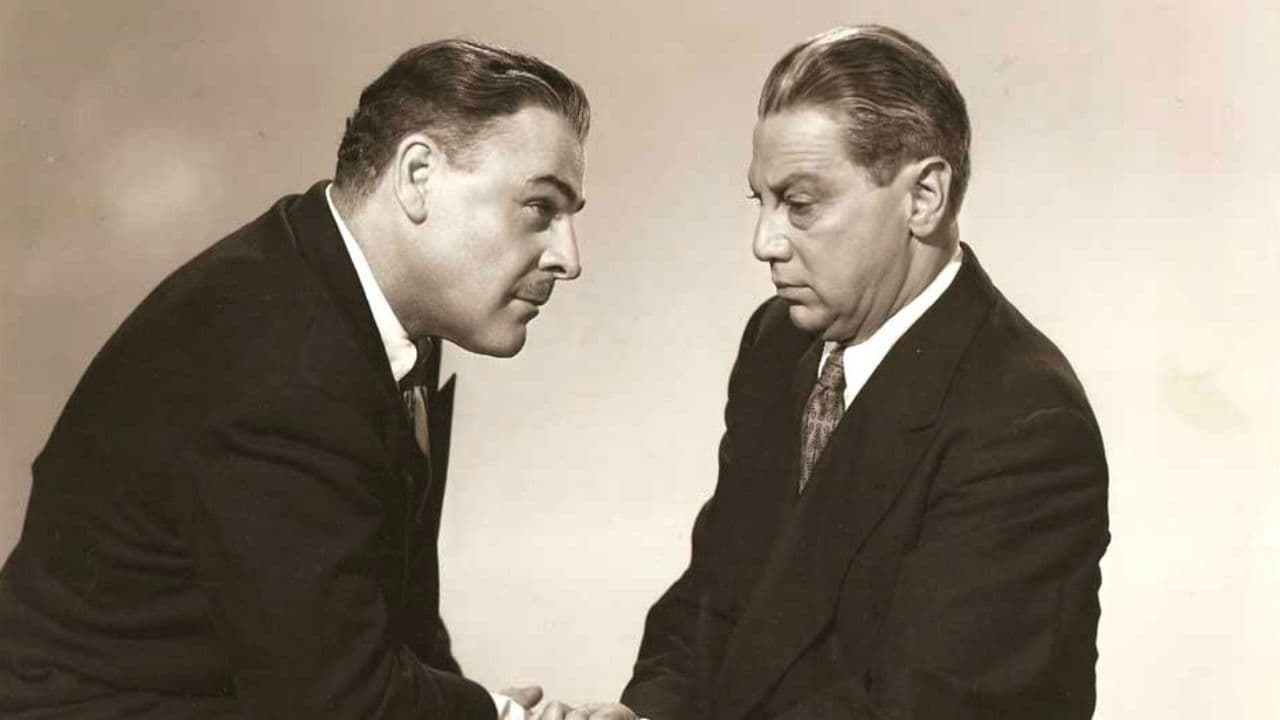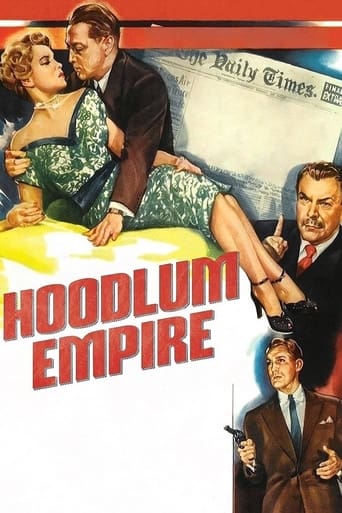SoftInloveRox
Horrible, fascist and poorly acted
Bea Swanson
This film is so real. It treats its characters with so much care and sensitivity.
Nicole
I enjoyed watching this film and would recommend other to give it a try , (as I am) but this movie, although enjoyable to watch due to the better than average acting fails to add anything new to its storyline that is all too familiar to these types of movies.
Kayden
This is a dark and sometimes deeply uncomfortable drama
krocheav
If you enjoy or grew up with 50s - 60s TV, then you could like this film. The story is not bad, it just doesn't get the treatment it deserves. Director/Producer Joseph Kane: of Republic serials, Gene Autry and Roy Rogers fame is in Television mode with this feature. The best performances are given by the prolific (and once Oscar nominated) actor: Gene Lockhart ("The Sea Wolf" etc). Luther Adler: (ex Broadway Director) an always believable professional, excels as the sophisticated crime boss who'll stop at nothing to protect his empire. You may remember him from: "The Desert Fox"'51 ~ "The Last Angry Man" 59, ~ "The Brotherhood" '68) he adds a good degree of class to this mild Republic picture. A fair main lead is given by John Russell in a pre TV's "Lawman" role. Brian Donlevy is reliable, if a little wasted, as the Kefauver type character. Although the script is inspired by the Kefauver criminal activities investigations, its believability sadly stops there. Good lines (with strong statements of fact) are given a superficial TV treatment. Art Direction, Set Decoration, Music, Photography, are also along the style of TV. Although the Cinematographer Reggie Lanning worked with the great Buster Keaton ("The Cameraman" '28) and is also known for "The Wake of the Red Witch" (along with this Director) at this time, both men were crossing over to TV. The richly textured detail of well made 40s films is missing here. Writer: Robert Considine (A.K.F. his collaboration on 'Thirty Seconds Over Tokyo') was an ex Hearst journalist (noted for using two typewriters at once) he also had close writing associations with several American Presidents. The two leading ladies: 1. Clair Trevor, gets to wear many sets of 50s clothing 'styles' (some OK, others slightly ridiculous) and chews the scenery in accord with the script. She's done far better. 2. Vera Ralston, ex Czechoslovakian ice skater ~ brought to Hollywood by Republic Pictures boss Herbert J.Yates, as his 'Protege' (and later wife) is mildly pretty and tries earnestly enough.If not overly discerning, watch this for a couple of good performances, a well intended basic story (smashing the corrupt slot machine racket) or as a 'time' piece. This film has been called 'Noir' by some, but it's basically Television. The Olive DVD transfer release is of recommendable high quality.
Martin Teller
Hoodlum Empire - 5/10Senate committee hearings investigating the gambling rackets threaten the reputation of a former gangster gone good. Capitalizing on the Kefauver hearings, this is a pretty dull story with pretty dull characters and a messy, tedious flashback structure. None of the performances light up the screen, even Brian Donlevy and Claire Trevor are rather disappointing. The script is corny and clichéd, the execution of it is uninspired. Nothing about the film is outright horrible, but there's no reason to recommend it.Hoodlum Empire - 5/10
bob the moo
It is the 1950's and the US Government is coming down hard on organised crime, going after the top men in order to cut off the head and kill the snake. Their current target is one Nicky Mansani, the elusive mob boss who has so far managed to stay away from his own senate hearing. As the statements and testimonies come in, the main event is one Joe Gray – who has turned state's evidence against his former mob colleagues, having come back from WWII as a hero and a new man. However, the others aim to prevent Joe from testifying and even set him up for prosecution.With a title that sounded dark and foreboding and offered the suggestion of a dark crime pulp thriller, I set the video and figured I'd give it a go. However the opening credits suggest a standard period genre film with no frills, an image that the film sadly maintains with the majority of its material. The actual story is a good idea but it is delivered in such a totally flat and unengaging manner that it is really hard to get involved with the film. The flashback structure is difficult to pull off so it is no surprise that the film struggles, but no excuse for being such a mess in regards narrative. The flashbacks are not tense or urgent enough – they needed to be tight, telling and convincing; instead they were often slow, boring and irrelevant. The bits that do work well are lost in a load of scenes that add little to the film and any possible tension is really sucked out of it. As the story goes on it becomes a bit clearer as to its focus and direction but I only really got into it by making an effort and stayed with it despite the delivery – not because of it.The tone of the film is very melodramatic as opposed to tough and noir-ish and this too is a problem. The dialogue matches this tone and it is too soapy to really suit the subject matter. With the story weakened by the flashback structure and the dialogue being all a bit too melodramatic and earnest, the actors do not have a great deal to work with other than stereotypical cardboard roles from the genre. Russell is far too square and rigid; he never convinces as a former wise-guy and is far to clean-cut and boring as a reformed character. Ralston's character is totally unnecessary and without her the film could have lost most of the WW2 flashback; she is rather bland and added nothing to the film. Withers played blind by being as stiff as a board – sadly he did this in his delivery and not just his posture. Adler is OK but not convincing as a big boss; Tucker is better and more fitting the genre even if it is a by-the-numbers character. Claire Trevor is underused but a good moll and the always-interesting Donlevy was given a solid role in support (I like him – and not just because he is from Northern Ireland!)Overall this film had potential but it blows it in the delivery. The melodramatic and morally simplistic tone feeds through the script and damages the whole film. The flashback structure is difficult to pull off at the best of times and it falls flat here, producing scenes that are dull, disjointed and unengaging, robbing the subject matter of the dark tone and tight pace that it really needed. The cast are mostly wooden and stiff, with even the OK ones failing to bring much life to this film. Not really worth seeing and I understand now why so few people have seen it.
bkoganbing
Hoodlum Empire was Herbert J. Yates and Republic Pictures way of cashing in on the Senate Rackets hearings that were chaired by Senator Estes Kefauver. A forgotten figure today, Kefauver almost rode the publicity of those hearings all the way to the White House.Yates put together a competent company of players to tell this story. I wish he'd given them a better story. John Russell is the nephew of a Lucky Luciano type mob boss played by Luther Adler who has an attack of conscience and gives up his rackets inheritance for a gas station in some town in middle America. Of course other associates of Adler's like Forrest Tucker aren't so keen on Russell just walking away. He knows too much.As Hollywood coincidence would have it, Russell's company commander from World War II rises to the US Senate and he's the Kefauver figure. Crusading, crimefighting Senator Brian Donlevy has a subpoena out for the big crime bosses and Russell's on his witness list. So is Tucker, Adler, and so is Claire Trevor. One of the highlights of the Rackets hearings was the appearance of Bugsy Siegel's gal pal Virginia Hill and Trevor's character is modeled on her. Claire Trevor is as usual, the moll with the heart of gold. Russell's dumped her for a war bride from France played by Yates's wife Vera Hruba Ralston. She was queen of the Republic lot, like Norma Shearer was at MGM when she was married to Irving Thalberg. Of course Republic wasn't exactly MGM and Ralston didn't have quite the talent of Norma Shearer.So Trevor's got her own agenda and its mixed in with this stew of a story which I will not further elaborate on. She and Adler are the standouts here if one can stand out in this. Adler was one of the best character actors in Hollywood at that time. He was usually a villain and played all kinds of ethnic types. He did a much better gangster portrayal later on in The Brotherhood. Today's audiences won't find this appealing, especially if they don't know who Estes Kefauver was.

